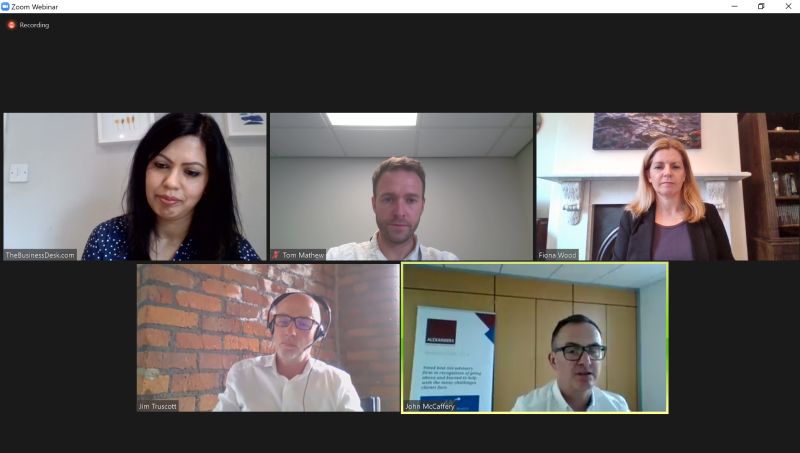Family business: Why preparation is key when it comes to succession planning

Family businesses are at the heart of a strong economy.
These firms are part of the fabric of the community, and it is not uncommon to find generations of families following a pattern of working for the same businesses, drawn by family values and long-term goals that can add a real point of difference.
However, it can also be tough especially when it comes to figuring out who will take over when the first- or second generation takes a step back.
Recently HBO’s dramatised series on family business, Succession, highlighted what can happen if owners don’t plan for the future.
TheBusinessDesk.com recently spoke to a panel of experts on the future of family businesses in 2022 and what owners need to be thinking about when it comes to building the basis for a great family legacy.
Panellists included: John McCaffery, Tax Partner at Alexander & Co; Tom Mathew, Director, Dunsters Farm; Fiona Wood, Partner at McAlister Family Law and Jim Truscott, Partner, Beyond Corporate.
Highlighting the importance of careful planning for the future, Tom Mathew, director at family-owned Dunsters Farm, stressed the need for family business owners to have the ‘difficult conversations’ about the future of the business.
Matthew and his sister Hannah Barlow are directors of the third-generation family business which was founded by his grandfather as a 1960s milk round.
For nearly 60 years the company has supplied a wide range of businesses including hotels and restaurants, catering and hospitality businesses, schools, colleges and hospitals.
He joined the business after a career as a corporate lawyer and is currently commercial director.
“It’s always a journey with a family business and you’ve always got to be looking ahead,” said Tom.
“Those that are successful or the least stressful are the ones who are looking around the corner to what’s next.
“And we’ve been at both ends of the spectrum where it’s not been planned at all, and we’ve come a long way from there to where we have got a good level of planning.
“In terms of the family involvement in the business, my sister and I run the business on a day-to-day basis, and we joined together around seven years ago. Previous to that we both had our own careers and came into the business when there was no succession plan at all.
“It was a bit of a taboo subject which is often the case in family businesses.
“We were pushed to go and do our own thing and get our own careers and not to be forced into the business. But it would have been better if it was discussed and planned.”
Matthew and his sister have both since brought some structure to the business with a plan for the future thanks to bringing good advisors on board.
He said: “It’s really important for family businesses who might think advisors are an expense or think they don’t need them to understand the peace of mind it brings to have a plan and to understand what to do when something happens.
“So, we have now formalised the overall structure of the business and we’ve got shareholder agreements in place.
“My mum has retired now having worked in the business since she was a teenager. My dad is still involved as our chairman and he’s still interested and enjoys working on the business.
“So, there’s three of us who work together but we’ve got the agreement in place. We’ve got the links to the relevant insurance documents and policies that should something unfortunate happen to one of us that the business can continue to provide and give stability to the business and to our employees.
“We’ve also worked a lot on the structure of the business to make sure it works for the future.”
He added: “We’ve grown fairly rapidly in the last seven years. And we need to make sure that we’re always fit for the size of business that we are and we’re not behind. So, we’ve recently made our first non-family directors’ appointments, which I recommend, and we have a dual board structure where we’ve got a family board, and then we’ve got the day-to-day management board beneath that. That’s very new to us, but it has started well and is working for us.”
In terms of future planning in a tax efficient way, John McCaffery, tax partner at Alexander & Co, said one of the issues he regularly comes across in family-owned businesses is when successful companies end up with surplus cash which is often reinvested into property, investment funds etc.
“The whole trading nature of the business disappears for tax purposes, and then exposes the whole business to an inheritance tax problem,” he warned.
“You’ve then got to look at how you separate out the business into trading and non-trading elements and then pass it down on the generations.
“Other problems can rise from shareholders or first-generation shareholders who have 3 to 5 children. Some might be in the business, and some might not be. But those that are not in the business might want a share of the value of the business and the siblings working in the company end up fighting over the fact that they are driving the value.
“And that takes some careful structuring in terms of making sure that the business can continue to function which is where shareholder agreements and articles drafted from a legal point of view is particularly important, whilst also making sure they can pass on the value to those other non- working shareholders.
“Other structures that frequently work are trust structures wherein a trust with trustees operate elements of the business for the ongoing benefit of future generations with all family members benefiting as beneficiaries.
“They’re not the most tax efficient structures but they work well from inheritance tax point of view, but it is a structure that is quite equitable in terms of the fact that there is a legal separation between the benefit and the legal ownership.”
Jim Truscott, partner, Beyond Corporate, said when it comes to succession, planning ahead is key.
“If you’re an entrepreneur and you own a business and you’ve grown it, it’s your baby and then you can sell it and pass it on to a new generation.
“That’s intrinsically difficult when you throw in the family dynamic as well where the next generation may have different strengths and weaknesses and different ideas of progress.
“The new entrepreneur will have a different take on what it will take to succeed in 2022 than what it took 20 years ago.
“It can be a real challenge for sure and it can pull businesses apart.
“We acted for a business last year which was grown by mum and dad into a very successful large business.
“They got to the point where they were still running it while in their 80s, their sons were in their 40s but they hated each other and there was no way to fix this mismatch of expectation between the sons and so the business had to split in two.
“There’s no fix to all of this other than just to recognise the challenges in family businesses, but the fact that if you get it right it can be hugely powerful.
“We would tend to advocate putting in place frameworks, agreements, family councils, a legal structure which can set a framework within which people can act.
“But that of itself is not a panacea for all of these difficulties.”
Fiona Wood, partner at McAlister Family Law, also stressed the need to think more carefully about business structures, pre-nups and shareholder agreements because complications can arise when it comes to a divorce involving a founder, director or shareholding relative.
She noted that in the vast majority of divorces where the husband and wife are shareholders, there haven’t been shareholder agreements in place.
However, in those divorces where the agreements are in place they have been ‘extremely helpful.’
“The agreements say what’s meant to happen to the shares if one of them leaves and in some cases even tells you how to value those shares which actually creates a lot of certainty within the divorce and allows people to get from A to B in a divorce much more easily.
“In terms of pre-nuptial agreements and post-nuptial agreements they can be extremely useful and a good way of protecting shares in a company.
“Whether or not your spouse has shares in that company, it may well mean that you can even ring fence the company so that is not part of a divorce settlement depending on what other assets there are.
“Whilst it may not sound like the most romantic of things, they are becoming much more common, and the courts are now far keener to uphold them.
“Again, it stops people from having a very acrimonious and perhaps protracted expensive divorce and gives a level of certainty which most people who are getting divorced would like to have.”
She continued: “In many family businesses there is often one quite powerful personality within it and whether or not they’re the main shareholder, they’re still the person with the power.
“And often they don’t recognise the need to document things a little more formally often because they haven’t got time and they’re excited about the prospect of growing their business.
“But a bit of housekeeping is essential. It may sound a bit boring getting the lawyers and the accountants involved in that level of detail at the beginning, but a small amount of time doing so would make quite a big difference whether you have a shareholder’s dispute in the future or whether there is a divorce that impacts the business.”









